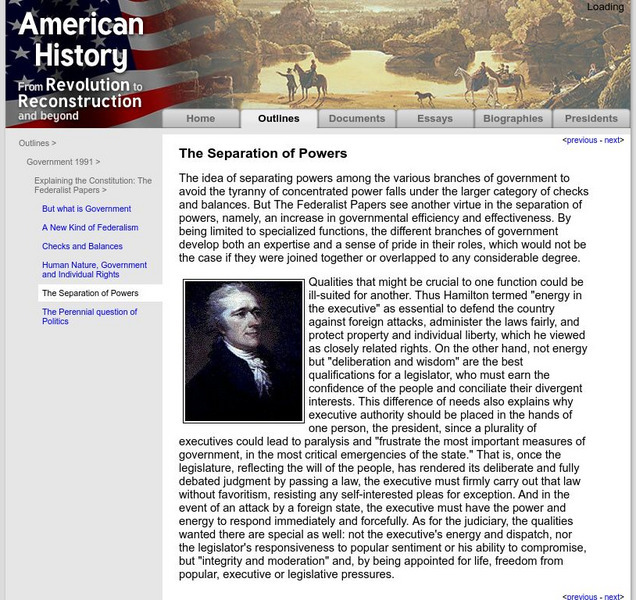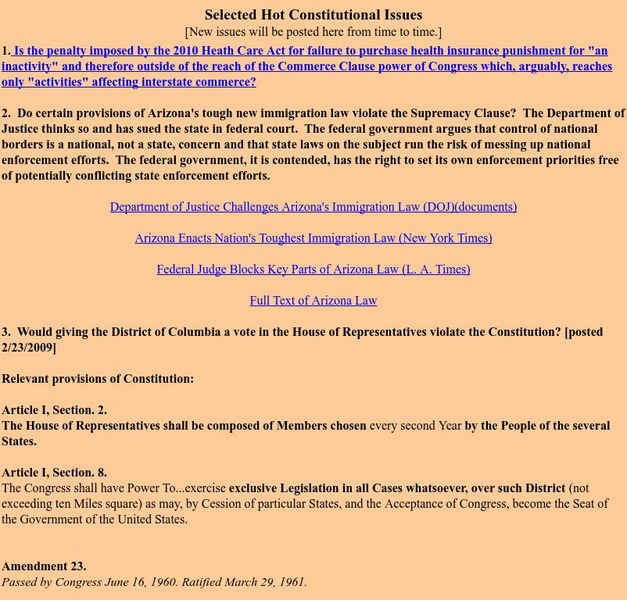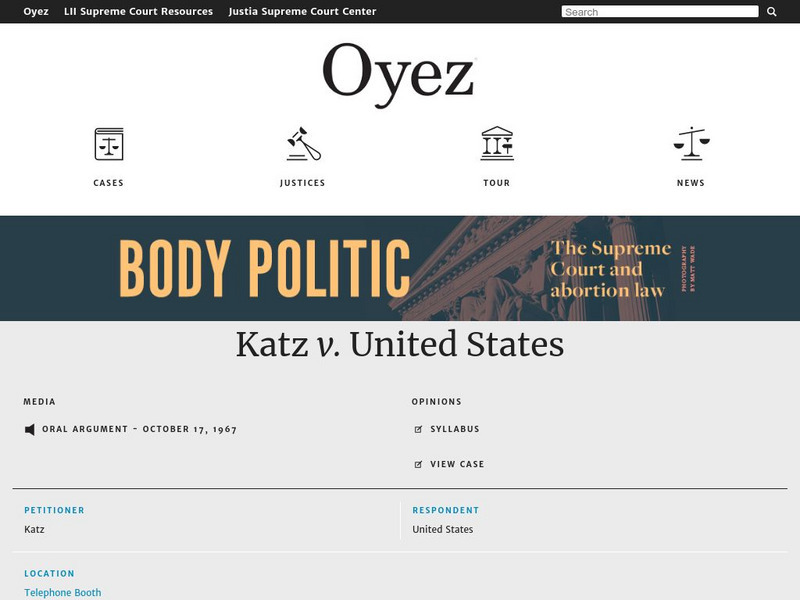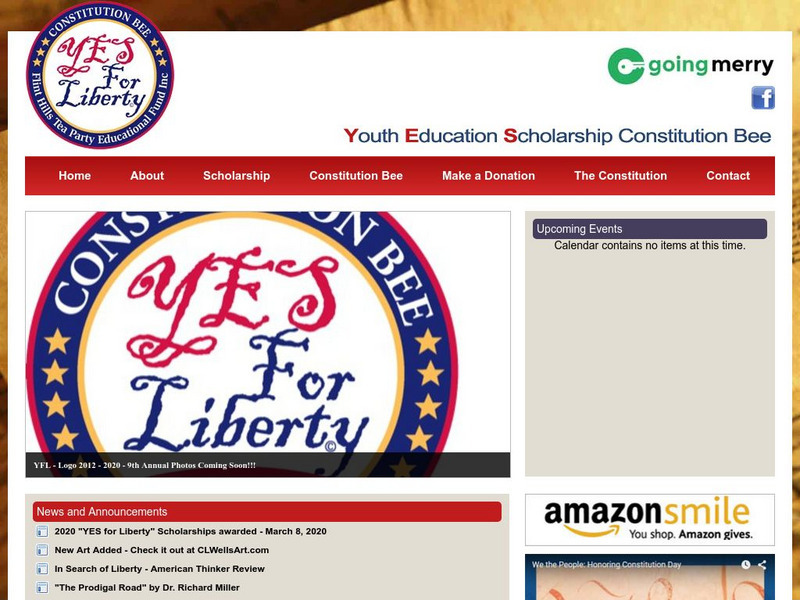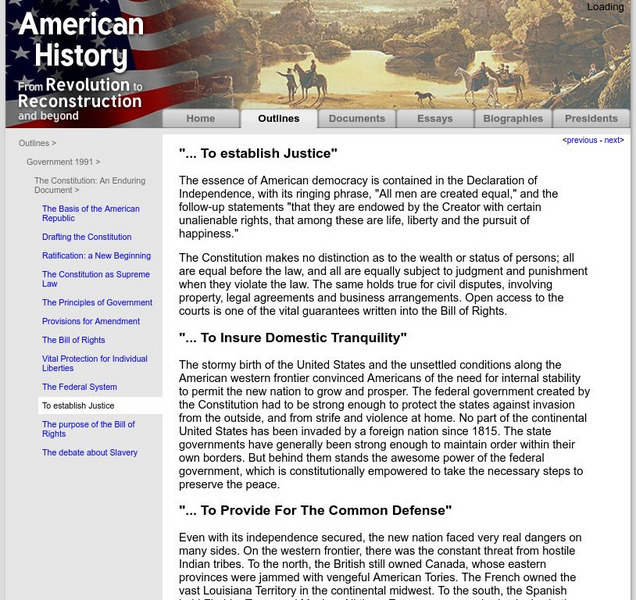Hi, what do you want to do?
University of Groningen
American History: Outlines: The Separation of Powers
Informative discussion of the ideas behind the Constitutional principle of Separation of Powers.
US National Archives
Docsteach: The Big Ideas of the u.s. Constitution
For this activity students will identify and define seven key ideas contained in the U.S. Constitution by making matches from the grid. They will then analyze documents that demonstrate each big idea in action.
University of Missouri
Exploring Constitutional Conflicts: Select Hot Constitutional Issues
Among other issues considered, Hot Constitutional Issues probes into the constitutionality of giving Washington, D.C. a vote in the House of Representatives, raised in 2009.
Illinois Institute of Technology
The Oyez Project: Katz v. United States
Katz v. United States altered the meaning of the 4th Amendment, the right to search and seizure, appealing his case in 1967 regarding the investigator's use of electronic surveillance. Oyez features the facts and recordings from the...
PBS
Wnet: Thirteen: The Supreme Court: Landmark Cases: Marbury v. Madison (1803)
PBS features a summary of the landmark Supreme Court case of Marbury v. Madison, which deals with the principle of "judicial review." Opinion written by Chief Justice John Marshall.
iCivics
I Civics: Changing the Constitution
America's constitutional government has changed over time as a result of amendments to the U.S. Constitution, Supreme Court decisions, legislation, and other practices. Students will use the seven basic principles found in our government...
Other
Hungarian Electronic: Establishment of the Dual Monarchy
An in-depth essay from the Hungarian Electronic Library on the dual monarchy of Austria-Hungary. It explains the political affairs, the constitutions, and the main principles of the agreement.
University of Groningen
American History: Outlines: Human Nature, Government and Individual Rights
Overview discussion of the views held by Madison and Hamilton that people, in general, need to have written into the law certain checks and balances to guard against abuse of power, protect individual rights and encompass a pluralistic...
Other
American Revolution: Those Glorious "Principles of 1776": Confederate Perspective
This site explains the Southern perspective on the voluntary union of states and the justification for the South seceding from the Union.
iCivics
I Civics: Constitutional Principles
The Founding Fathers created a government based on a set of fundamental principles carefully designed to guarantee liberty. This lesson lets learners look at the Constitution from the perspective of its foundational principles and make...
Stephen Byrne
History for Kids: United States Constitution
History for Kids provides an overview geared toward elementary age students of the history of the United States Constitution. Includes links to resources for teachers.
Other
Yes for Liberty: Youth Educational Scholarship Constitution Bee
This organization seeks to educate youth about the Constitution and its founding principles. Each year they hold a Constitution Bee. Study materials and a quiz for learning about the Constitution are provided on the site, as well as the...
Digital History
Digital History: American Revolution: Introduction
The American Revolution included so much more than just the War for Independence. Read about why it was the first modern revolution and discover the principles that the American revolutionaries were fighting for.
Tom Richey
Tom richey.net: The u.s. Constitution: Framing, Principles and Ratification [Ppt]
Presents key ideas for examining how the Articles of Confederation were replaced with the Constitution and the compromises that were reached during debates.
University of Groningen
American History: Outlines: To Establish Justice
Outline explaining the ideals and intentions for a newly formed nation as spelled out in the of the Declaration of Independence.
University of Groningen
American History: Outlines: Checks and Balances
Overview of the principle of checks and balances proposed in the Federalist Papers.
Other
Freedom Forum: Lesson Plans for the First Amendment
These lessons address constitutional principles and contemporary issues involving the First Amendment. They intend to have explore how freedoms began and how they operate in today's world. Students will discuss just how far individual...
Other
Constitutional Principle: Charles Pinckney and Separation of Church and State
A short article describing Pinckney's views on religion and the role of the state. Excerpted from a book by Anson Phelps Stokes.
Bill of Rights Institute
Bill of Rights Institute: Founding Principles
Below, you will find suggested definitions of each principle. Click here to read the words of James Madison, a primary contributor to the Constitution, and other Founders on these principles.
Other
Touro Law Center: William Marbury vs. James Madison
Transcript of the landmark court case that established the constitutional principle of judicial review. Judicial review is the concept that the federal judiciary has final power as to whether an act of the Congress or the Executive...
National Cable Satellite Corporation
C Span Classroom: Free Resources for Teaching Civics and u.s. Government
This is a site filled with current events that make connections to the relevant historical topics. There are six clickable topics, the videos of which are updated weekly. RealPlayer is needed and registration is required to stream or...
Stephen Byrne
History for Kids: Bill of Rights
History for Kids reference page provides an overview of the Bill of Rights, outlining each of the ten amendments, and teaching about the history and principles of the U.S. Consitution and first ten amendments.
Bill of Rights Institute
Bill of Rights Institute: Constitutional Principles
James Madison knew that a key challenge of maintaining just government was framing it in such a way that the government would be forced to control itself. How does a system of separated powers-and the checks and balances built into those...
Center For Civic Education
Center for Civic Education: The Legacy of Ronald Reagan [Pdf]
This lesson traces Ronald Reagan's ascent from obscurity to the pinnacle of political power in the United States. It also examines the constitutional, political, and civic principles associated with the public life of Ronald Reagan...





